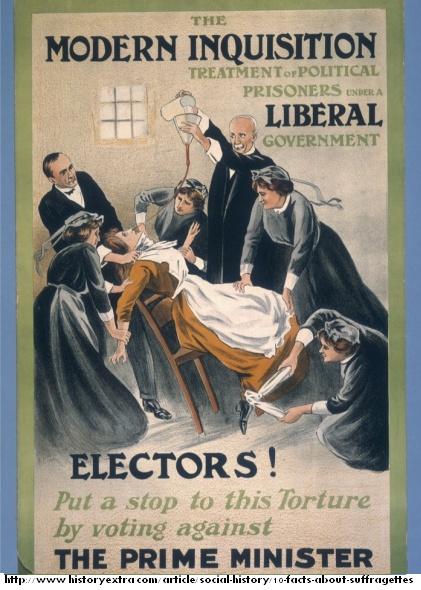The UK celebrates on Feb 6th 100 years since the Representation of the People Act 1918 gave the vote to (some) women in Britain, those over the age of 30 and meeting certain property qualifications. It also gave the right to vote to all men over 21. In 1928 suffrage was extended to all women over the age of 21.
Campaigners were mainly suffragettes (the Women’s Social and Political Union led by militant suffragette Emmeline Pankhurst, her daughter Christabel and Emily Davison who was killed during a horse race whilst carrying a votes for women banner into the racetrack). They engaged in acts of sabotage, hunger strikes (enduring distressing force feeding), window smashing, and burning property. During WW1 they stopped the campaign in order to contribute to the war effort.
The suffragists, instead, undertook actions more purely in the realm of nonviolence under the leadership of Millicent Fawcett’s Women’s Suffrage Federation (with the participation of Sylvia Pankhurst- also Emmeline’s daughter, who later became a socialist activist in the fight against fascism and colonialism) and continued the struggle until the end of the war. They opposed the war and supported conscientious objectors.
Amongst the men who became supporters of women’s suffrage we can mention Henry Hunt MP and John Stuart Mill who also became an MP for the Liberal Party. In the US Parker Pillsbury and other abolitionist men also advocated universal suffrage.
Britain came relatively late to women’s suffrage. In 1881 New Zealand was the first country to grant all women the right to vote. In 1893 women in South Australia achieved the same right and became the first to obtain the right to stand for parliament in 1895. In the United States, white women over the age of 21 were allowed to vote in the western territories of Wyoming from 1869 and in Utah from 1870. Limited voting rights were gained by women in Finland, Iceland, Sweden in the 19th Century. Norway followed, granting full women’s suffrage in 1913. Denmark followed in 1915. Canada in 1017, Austria, Germany, Poland in 1918, the Netherlands in 1919, and the United States in 1920.
More latecomers include Spain in 1933, France in 1944, Italy in 1946, Argentina in 1947, Greece in 1952, San Marino in 1959, Monaco in 1962, Andorra in 1970, Switzerland in 1971 at federal level, and at local canton level between 1959 in the cantons of Vaud and Neuchâtel and 1991 in the canton of Appenzell Innerrhoden, and Liechtenstein in 1984. Wikipedia
In 1948 the United Nations adopted the Universal Declaration of Human Rights; Article 21 stated: “Everyone has the right to take part in the government of his country, directly or through freely chosen representatives. The will of the people shall be the basis of the authority of government; this will shall be expressed in periodic and genuine elections which shall be by universal and equal suffrage and shall be held by secret vote or by equivalent free voting procedures.”
Voting has helped women achieve some rights but it has become abundantly clear that there is still a long way to go. Sexual exploitation and harassment, the “glass ceiling”, lack of equal pay for equal jobs, the burden of care for relatives in a shrinking funded care sector and the much smaller number of women in top jobs and political positions show how much more work needs to be done. But there are role models for young women and that opens many possibilities.
For black women things have been even more difficult. According to her autobiography Nichelle Nichols (Lt Uhura in Star Trek) was told by Martin Luther King “she couldn’t leave [the show] because she was a role model for millions of young girls and women – the only African-American on TV in a role worth having.” The Guardian. And it took some time for Rosa Parks to get the recognition she deserved.
Apart from voting to advance women’s rights today the emergency is to use our vote for Peace and Nonviolence, against nuclear weapons, against inequality, for disarmament and for investment in clean energies, both because of climate change and because of health. We are lucky that women in the past fought to give us the right to vote, but if we do not use it to strongly support the efforts of those working to humanise this world we are not honouring their work.






